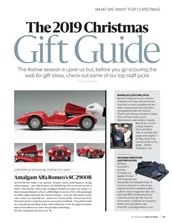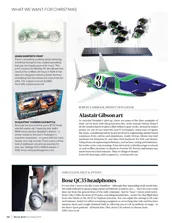

Xmas gift guide
Gordon Cruickshank, Editor-at-Large Amalgam Alfa Romeo’s 8C 2900B Several factors make a car special – beauty, rarity, performance, racing achievements – and Alfa Romeo’s 8C 2900B tops the scorecard on…
RACING COACHBUILDERS ENTER THE SPORTS CAR MARKET.
ATTRACTIVE CORSICA BODIES ON HORNET SPECIAL CHASSIS
BUILDING racing-car bodies is definitely an art on its own. The successful production must combine lightness with strength, a structure which is either strong everywhere or else flexes in the right places, according to the chassis on which it is mounted. Apart from this, owing to the unexpected troubles which occur in races, it is essential to be able to get at the transmission and other components which are discreetly hidden on the touring vehicle by immovable floorboard or seat casings.
The Corsica Company, of Grimaldi Street, London, N.1, have been engaged in this specialised craft for the past twelve years, some of their earliest products being the bodies on the 40-50 Delages which appeared at Brooklands in 1925. The Maseratis introduced into this country have all had Corsica bodies, as also many of those on Mercedes chassis. In addition all kinds of special bodies, light concealed head coupes and the like have been evolved in their workshops. The Company has now come out with a range of bodies on Hornet Special chassis which reflect lessons in weight and accessibility learnt from racing practise. In actual fact a chassis was marked with chalk at parts requiring attention and designers continued their efforts until all points could be reached from above. By mounting the side members of the body outside and actually below the chassis side members, the centre of gravity has been brought extremely low. The most striking body is the two seater, finished in grey with red upholstery which is illustrated herewith. The bonnet and front end of the body follow the lean lines imposed by the usual Hornet Special radiator and bonnet. The scuttle forms at the rear two winddeflecting cowls, and the single piece windscreen has a rubber strip in its rear edge so arranged that the greater the wind pressure the more firmly it seals the gap, so that there is no chance of rain getting through. An electric windscreen wiper is mounted in the middle and operates two wiper arms. It picks up its current
through a spring contact pressing on an insulated bush on the scuttle, and so the screen may be removed for racing without disturbing the wiring.
Two doors are fitted, and the sides of the body are cut away to allow full elbow room for possibly heavily clothed occupants. The sloping tail rounded behind the seats and tapering to the rear, with flat slopes on either side of the raised portion gives the rear of the car at once a sporting and a solid appearance and is a pleasant change from the more usual rear view of vertical petrol tank and wheel. The spare wheel is of course carried in the tail, and a large quick-opening petrol filler is situated on the near side. Looking under the bonnet, the first interesting point is the way in which the wiring at the back of the dashboard can be reached by swinging forward hinged
member at the rear of the frame and swings back past the vertical allowing the tank and back axle to be inspected with the greatest of ease. The hood is carried on a detachable frame which fits into special sockets in the tail when not in use, and is strapped in place to prevent rattle.
The back and front wings are easily removed by slackening three nuts on each, and the rear end of the body comes off in sections to facilitate attention to the back axle.
By reason of its low slung and solid construction, the Corsica two-seater has almost the stiffness of a racing car, and can be taken round sharp corners with the tyres screaming without any feeling of whip or roll.
The driving position is comfortable, with ample leg room with the seats right back, and the sides of the body are cut away to allow freedom at the wheel. The instruments are mounted so as to be readily seen, and the starter button is mounted alongside them.
The car complete weighs under 151 cwt., and with its clean lines and the proven liveliness of the Hornet chassis, should give an excellent account of itself in trials and competition. It costs £275. The short four-seater follows more conventional lines, but embodies the features of low hung body frame and accessibility of all parts. The seats are comfortable, fitted with pneumatic upholstery and the front ones slide on Leverall fittings to facilitate getting in and out of the car. The hood drops on to a ledge around the back of the car and the hood sticks are held steady by springs. It is
easily folded and a hood-bag stiffened by light metal plates completes the trim appearance of the back of the car. Por all-weather use, especially for a professional man, one could hardly im
agine a better body than the four-seater coupe. The head is spring-loaded so that it can be raised or lowered with one hand, and the fabric portion drops neatly into a recess behind the back seat without any elaborate packing. With the hood cover in position, the folded head occupies no more bulk than an equivalent ‘hood on an open car, in spite of its lining and padding. As on the other models, the leather and upholstery generally is of a
high order and makes the Corsica models small cars de luxe.
The four-seater and the drop-head coupe weigh respectively 16 and 16f cwts., comfortably under the chassis limit, and cost £275 and £297 10s.
flaps. The space under the scuttle is reserved for tools, and there is room for fitting a spare petrol and oil tanks if required. The usual gap at the bottom of the driving compartment is sealed by flaps which can be removed in summer to allow a cooling draft from the bonnet louvres. The carpet is in several pieces, secured with spring fasteners and the floorboards, which are secured by carriage locks, lift up to give access to the battery, gear-box filler and other parts requiring attention. One can also observe the manner in which the body frame carried outside and below the chassis, with a thick layer of felt to seal the gap between them. A fire. is carried in a frame under the
scuttle. The most interesting part of the whole car is the tail, which hinges on a cross